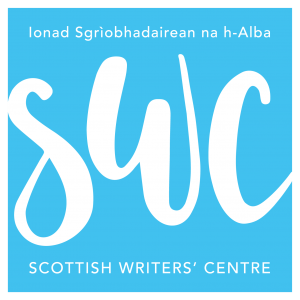On Tuesday 6th September, the Scottish Writers’ Centre journeyed to the East End for a night of poetry and music. Although it wasn’t our usual place of residence, it was entertaining and creatively diverse.
Beforehand, I had the pleasure of speaking to the poet behind the event, Mary Thomson. She is one writer who fairly represents literature in the East End, a place not prominent in all things literature-related. In this interview, I asked her about the event, as well as how the East end influences in her writing.
Originally from Yorkshire, Mary moved to Scotland in 2005. She has worked as an art critic, curator and freelance writer. Alphabetical Order is the fifth in a series of poetry pamphlets she has published.

Tell us about your inspiration for organising this event. What is the event about? Who is it for?
Mary Thomson:
There has been very little happening, literature-wise, in the East End and, knowing the venue, I thought it would be good to try and tempt audiences to travel from the rest of the city and to offer a poetry event to a local audience where I live.
Has coming into the East End of Glasgow from elsewhere had an influence on your writing?
MT
Ten years ago I moved from rural Yorkshire to Scotland, so since then have been adjusting to a change of country and culture. The big change of moving from the country to the city was reflected in poems in the next pamphlet Comings and Goings, then after a year living in the East End I put out a very small sequence of poems called, simply, East End. In that I naturally wrote about some local landmarks – but as metaphors for ideas. Clearly, life experiences are crucial to my writing; creative people are always looking to validate, record, examine or celebrate what happens to them through their art, whatever the medium.
Whilst reading your poem St Mungo’s Burying Place, I noticed it pays homage to St Mungo. You appear to take an historical and factual approach to this poem as you refer to his tomb in the cathedral with undertones of factual references, for instance the fact that he was nicknamed ‘dear one’ came up in the first stanza of the poem. I was wondering because you are not from Glasgow, did writing this poem make you feel more connected to/ or at home here?
MT
I have always enjoyed knowing about the landscape I have lived in, from its geology, through its archaeology, its history, the visible evidence of what its geography looks like and what and why man has built in it. I have moved many times and each time have learned a new history of what is under my feet or in front of my eyes, because I’m curious and it pleases me to know, (see the last phrase of the poem Alphabetical Order) not in order to make myself feel at home, though it has that effect I suppose and may explain why I have always relished the stimulus of change!
I was also wondering what St Mungo means to you directly, why are you interested in this figure?
MT
In addition, I have always had what I would call a keen sense of place or what artists refer to as genius loci. St Mungo died in approximately 627 and was buried on the site of what became the crypt of Glasgow Cathedral. Stories about him suggest that he was a modest and much loved saint and I imagined the first settlement, then the little wooden church built by his followers, then other hands building in stone until, 600 years after he died, the current cathedral took shape in the 1200s. So, though it is based on facts and an understanding of the geography and fauna of the site, my poem is strictly imaginative in its approach and arises from that sense of place experienced by his tomb, on frequent and regular visits to the cathedral. The way a poem looks on the page, has to reflect the feeling and meaning of the poem and you will see other examples of this in all my poems, but St Mungo’s Burying Place has a very solid look, as though stone has been set on stone to build something lasting.
The event broke down the metaphorical compass of writing in Glasgow, bringing people together creatively regardless of which direction they came from.
Each poet had their own sense of flair and originality. From Mary Thomson and her charming readings about her adjustment to city life from originally being a ‘country girl’, to Finola Scott’s darkly feminist rewriting of the fairy tale Red Riding Hood, to Lesley Traynor’s powerful deliverance of ‘Big Bad Wolf’, to Charlie Gracie’s tender reading of his very recent poem dedicated to his first born grandchild, all tied together with many other incredible poets and the amazing musical stylings of Will MacArthur – this event had it all.
It fully delivered on its promise, to bring East to West in style.
Words by Simranjeet Aulakh



